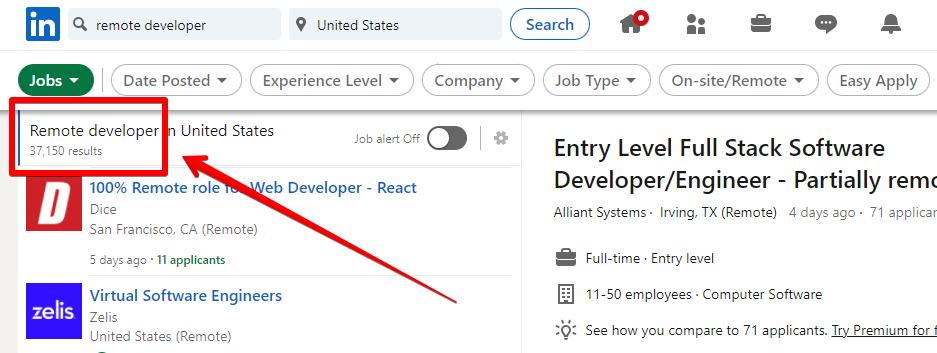The prospect of hiring a remote developer can be a grim challenge, especially if you’re a non-technical person.
Desirably, you need to know how to hire a remote developer but be ready for possible difficulties. This process can be energy-draining and time-consuming. Its inefficient execution can cost you and your company time and money.
We hope that after reading this article, you’ll feel more confident in your ability to hire the right talent for your business.
So let’s move on.
Contents
What Is the Process of Hiring Remote Developers?
Practice shows that an unemployed developer is not a very common occurrence today.
According to the survey conducted in 2019 (90K developers were surveyed worldwide), only 6.4% of developers were unemployed and looking for a job. In fact, representatives of this profession are lucky – they are always in demand.
The process of hiring developers includes many essential steps (that we’ll describe in detail below), from listing a job, screening a lot of candidates, and making phone calls, to eventually testing them.
Even if you hire a developer for distributed work, you won’t know whether they are true professionals until they start working.
Preparing for the hiring process, consider the following issues (and feel free to expand this list):
- Where to find good remote developers.
- What professional skills and qualities they should have.
- How to attract and hire the right talents.
- How to identify whether they are a good fit.
- How much to pay for remote work.

Image source: Unsplash.com (NordWood)
Why Hire the Most Talented Developers
All restaurant owners want to have the best cooks in their teams, all taxi bureaus wish to have the most qualified drivers, and all project managers want to hire the best programmers for their startups.
It’s not a secret that higher-quality professionals always lead to better and more cost-efficient results in a field as complex as software development.
What about the remote conditions?
Development teams can easily work in remote locations without sacrificing their efficiency, thanks to many project management software and collaboration tools. By the way, according to an analysis by the Economist, 75% of the jobs posted in the thread in 2021 mentioned remote work.
Businesses that will hire top software developers will have all the benefits of well-made software and pivot in the ever-changing tech scene.
What Are the Benefits for Employers?
Logically, all employers think about the actual benefits of hiring a remote developer when making their final decision.
These benefits typically include:
- Access to talent. Hiring virtually allows tapping into the global talent pool and finding the best employees.
- Reduction of expenses. Remote programmers do not require office spaces. They pay for their office supplies and all utilities.
- Adaptability. The capability to adapt quickly is what allows companies to stay competitive. Remote developers can tackle your project in a short period, implementing the most up-to-date technologies and approaches.
- Happier staff. Satisfied employees are more productive. They strive to help their company succeed.
What Are the Benefits for Employees?
Unfortunately, not every employee thrives under remote work conditions. This is the personal choice of every person.
However, individuals who choose to perform remotely find many advantages without going to work physically.
Here’re some of these benefits:
- Improved work-life balance. Many people suffer from traffic jams and public transportation. Distributed work decreases the need for commuting. It allows people to set their own schedules.
- Efficiency. The ability to set their own schedules makes it easier for people to focus on the tasks at hand. They work more accurately with less downtime.
- Boosted productivity. People who choose to work virtually are happier and healthier. They have more chances to get more things done during their working day.
- Less resentment. Working without the feeling of being micromanaged helps remote developers feel more relaxed.
Why Businesses Strive to Hire Remote Development Specialists
There are several reasons:
- Constant development. Remote specialists can work from different time zones. Their efforts facilitate continuous product development.
- Flexible working hours.
- Greater engagement. Developers who perform remotely are more engaged than their colleagues working from offices. They feel connected with the modern video conferencing tools.
- Remote development specialists have more time for any kinds of adaptations and updates.
- Advanced access to the workforce represented globally.
Are There Challenges to Hiring Developers for Remote Projects?
The process of hiring the right worker is always a challenge. However, real advantages come with understanding the difficulties you’ll face in your search.
Three are three common hurdles you may have:
1. Composing job postings
There is no ideal way to write an effective job posting. However, you must ensure that it attracts suitable candidates. Therefore pay enough attention to selecting appropriate job boards to post it on.
2. Vetting candidates
A good job posting will give you a pile of potential candidates who have to be sorted and vetted. By the way, this process will also require a decent amount of time.
3. Different languages
Your best candidate may not speak your language. It can lead to communication issues.
Note that some individuals who can write fluent English (or another popular language) can fail to speak it clearly (and vice versa).
All challenges highlighted above can be managed. The main idea is to realize what your remote team needs to get the job done.
Top Factors You Should Consider Before Seeking Remote Developers
Successful remote development depends on careful analysis of business requirements.
While hiring remote employees, make sure you consider the below-mentioned pointers to make your remote journey smooth.
1. Describing your development needs in a straightforward manner
Before attracting remote specialists, you must determine the development needs of your company as it will help you recognize what exact resource you need.
2. Thorough screening process
Try to recognize the top facts about the competence and dedication of remote developers. Conducting a technical interview session will help you evaluate their capabilities.
3. Choosing appropriate communication channels
Communication can be a big challenge during remote development. Collaborating on a project will help you manage remote team members and get better results when you outsource development services.
4. Flexibility
Expert developers come on board with their creative ideas and suggestions. Be ready to add innovative ways to incorporate flexibility and scalability in your project.

Image source: Unsplash.com (C. Hume)
By the way, these factors will be also helpful in case if you care about how to hire offshore developers.
It seems you already know a lot of things about the process of hiring remote development teams. It only remains to explore the specific steps of this process. Let’s dive in!
How to Hire Remote Developers in 8 Steps
Let’s take a closer look at each step of this process.
1. Write a job description
Starting to prepare a job description for your future remote developers, first identify the portrait of the ideal candidate. Define the skills and professional characteristics you want the candidate to have and consider all tech requirements.
Don’t forget to make the focus on seeking remote talents.
After you’ve prepared a decent job description, you’ll have to start the actual hiring process.
What are the rules of writing a job description for remote developers?
An excellent job description to hire a professional developer for remote projects requires a clear explanation of the skills needed, the compensation being offered, and the time expected.
- All should start with the right job title. Try to avoid fluff or superlatives when preparing a job title.
- Then write an accurate description that will include critical details (for example, skills required and your business’s expectations).
- List the job’s requirements. The candidates will utilize it as a checklist to understand if they meet all job conditions.
2. Post a job advertising
The next step you should perform is to find an appropriate job board and post your advertising.
There are many online job boards to choose from. Some of them allow selecting a specific geographical region where your advertising will be available.
Explore available boards and pick the one that will meet all your requirements. You can try reputed tech and job boards (for example, AngelList, CrunchBoard, or LinkedIn).
Remember that your goal is to convey your company’s mission along with what you’re looking for.
3. Review applications and study them carefully
When the applications start rolling in, you must inspect them carefully and select the best ones. In some companies, this responsibility belongs to a hiring manager.
4. Pick up the most shining CV
Selecting the best candidate from the pile is not an easy thing. The best cover letter should demonstrate advanced communication skills and attract from the first line.
5. Arrange an interview
Now you have several candidates to choose from and can move forward. Your next step is to conduct an interview.
First of all, the aim of the interview is to assess the candidate’s communication skills.
For remote employees, having an interview can be a challenge. But if it is running through a PC screen, you still can test the level of candidates’ communication.
Prepare appropriate questions to uncover their experience and understand whether or not their personality will fit with your team.

Image source: Unsplash.com (Ch. Deluvio)
6. Test and evaluate
Now your objective is to put the candidate through the special tests that will evaluate their performance.
The specific nature of the test will depend on the role to be filled. It will allow evaluating their skills and demonstrating how they behave under pressure.
Make sure you evaluate both the technical and soft skills of the candidate.
How should professional developers look like?
Try to consider people who have the following traits:
- Discipline.
- Maturity.
- Communication skills.
- Initiative to take guidance if necessary.
- The balance between family and work.
7. Make an offer
Now the ideal candidate that you’ve chosen is waiting for a formal offer. You can hire a remote developer for a trial period with committed payment or propose a full-time offer.
Do not forget to ask the legal team to provide a legally valid contract. It will contain the validation rules for a tax deduction or deductions for healthcare.
8. Onboard a new employee
Although the formal hiring process is over, you still have an essential step left. It’s all about onboarding.
You have to establish a schedule, communication channels, and announce project meetings. It’s also important to prepare a detailed list of things the new employee should know about the company.
Managing a Remote Team: Essential Rules to Remember
Collaborating with an allotment team, where people work in different locations, can be a permanent headache.
You may face a lack of communication or have problems with the integration of a new member to your remote development team. Keep in mind the following solutions if you want to hire distributed developers:
Ensuring smooth communication
Communication plays a critical role in any teamwork. Therefore you have to establish streamlined communication using various media.
Often, distributed software development firms use daily and weekly reports or conduct video calls to assess the progress of their tasks’ completion.
The matter of trust
It is always essential to trust the process. Remote work means that individuals have advanced control over their activities and are more independent in problem-solving and decision-making. Keeping that in mind, try to establish trust based on KPIs.
The role of integrations
Do not forget to propose to your virtual development team to communicate personally through arranging small happy hours in an off-work time. Even small informal virtual meetings will bring the team closer together.
A Freelancer Developer Vs. a Full-time Remote Developer
If you think that all the questions and pitfalls on this topic are over, then you are wrong. You will also have to make another decision about hiring a full-time remote developer or a freelancing specialist.
A freelancer is a developer who works on a contractual basis for a short period.
However, hiring a full-time staff can be a more appropriate option for your company. It all depends on the complexity and scope of your project.
What are the advantages of freelance developers?
- They usually charge more per hour; however, companies can save money by not paying for some benefits (health insurance and social security).
- If the relationships with freelancers are not working, they can be easily terminated. It reduces risks.
- They are responsible for their income. It means they are interested in delivering excellent work to their clients.
What are the disadvantages of freelance developers?
- They strive to balance multiple projects at once. This multitasking is not always beneficial.
- They don’t integrate as deeply into the company as full-time programmers would. It may lead to troubles in building warm relationships with the rest of the team.
- They often work on multiple projects. Many things can disturb them.
Here’s a short sight on why many businesses prefer remote developers but not freelancers.
| Criteria | Remote developers | Freelancing developers |
| Time frames | They work following a given timeline and guidelines. | They work with many customers. They don’t follow any company’s guidelines. |
| Security issues | They have to sign up an agreement and provide support to the project and maintain confidentiality. | They are independent and you cannot rely on them to maintain confidentiality. |
| Result satisfaction | They ensure that the product (or other solution) they provided satisfies the customer. | Their responsibilities are completed when the project is done. |
| Commitment | You can expect high-level commitment from them. | You cannot expect total commitment from them. |
Now you have to set aside some time for exploring the best places where you can find and hire your brilliant remote developers.
Best Places to Hire Remote Developers
Finding the right places where you can find and hire remote developers is also a critical process in the whole picture.
Here’s the list of ideas that may be helpful:
Freelance marketplaces
The marketplaces for freelancers will be helpful if you want to manage and complete a short-term project. You will find many freelancers who advertise their expertise there.
Here’re some examples:
- Freelancer.com
- Upwork.com
- Toptal.com
- Codesera.com
- Guru.com
- Codeable.com
Outsourcing agencies
You can contact one of such agencies and let them know what you are looking for. They’ll try their best and will find the proper development professionals for you.
Job boards
This resource is also one of the best places where to find and hire a skilled developer on your own.
Here are some popular job boards to consider:
- Remote.co
- We Work Remotely
- Jobspresso
- FlexJobs
- Working Nomads
- Landing.Jobs
- Remote OK
- Remotive
- Remotely Awesome Jobs
- NoDesk
- SkipTheDrive
Referrals
Another important way to get information on new employees. Referrals will help to familiarize you with unique talents and their essential skills.
You may not expect Reddit to be a valuable resource for seeking new talent. However, now it provides particular areas known as subreddits. These areas allow users from various niches to share their skills and make their self-presentations.
3 Tips on How to Choose the Right Candidate
Working with resumes may seem overwhelming. However, you should understand that hiring remote developers takes time. Remember that rushing the process will cause you problems.
The following recommendations will guide you on how to narrow down possible candidates and make sure you’re making the right choice.
1. Filter all interview participants
Choose CVs that totally match your criteria. Keep in mind two red flags that will be helpful in the filtering process:
- Candidates didn’t read the job description.
They aren’t worth your time, for sure. Their skills will probably not match what you need. Perhaps, they don’t have enough experience.
- A cover letter looks trivial and uninspired.
The role of a cover letter is vital. Remember that it’s pretty easy to lie and say you have enough experience.
2. Form your top-5
You will hire a developer after narrowing down the lot. So make sure the candidates show genuine potential.
Selecting the top five is not a problem. Base your decisions on the CVs, passion, and clarity of their thoughts.
3. Conduct an interview
After selecting the five leaders from the pool of applicants, you can run an interview with them.
Interviewing remotely means that you won’t have a chance to meet them in person. Therefore, you’ll need to apply different tools to make your life easier.
Some More Facts About the Process of Screening and Interviewing Remote Developers
Interviewing is a constantly evolving process. There are some reliable techniques you can use to qualify candidates before hiring.
Code challenges
Every candidate should go through a coding challenge.
It will help you to recognize how they can write code. You will learn more about the ways they apply to solve problems.
Here’s an example of a tool that will help you with code challenges – Hackerrank.
Technical interview
It will allow you to understand the candidates better, meaning their specific skills and professional knowledge. It may contain questions about the role and experience of candidates. You may ask about their career expectations and possible steps for achieving the new position.
Pair programming
According to this famous Agile practice, two programmers can perform together on a small project. It will demonstrate a candidate’s ability to work in collaboration with other team members.
Here’s an example of a tool that will help you with pair programming – Github.
Video presentation
This is a handy addition to the interviewing process. The presentation that may last 3-5 minutes will let you know what you can expect from the candidate regarding their personality, communication skills, enthusiasm, etc.
Here’s an example of a tool that will help you with arranging video presentations – Zoom.
Well, that seems to be all we wanted to tell you about how to hire remote developers. You’ve probably learned a lot of new information, haven’t you?
By the way, you can also find many exciting things in our article “How to Hire Game Developers“. Don’t hesitate to read it.
Final thoughts
Are you ready to hire a remote developer?
Well, by this part of the article, you must be sure that hiring remote developers is a difficult but rewarding process. Although managing a remote development team is complicated, its benefits are enormous.
By hiring a programmer for remote projects, you can stay confident about the product development success without any hindrances.
Try to find the best talents for specific tasks that meet certain professional requirements.
Let them be smarter than you. Let them be better than you. The main thing is that they will lead your project and your company to unprecedented outcomes and a grand victory!
FAQ
How do I hire a remote developer?
The solid reason to hire remote developers is about getting the best fit for your project from anywhere in the world. It all depends on your project. You may use different available channels to find talents: freelance marketplaces, agencies, or remote job boards. They all have their advantages and disadvantages; however, these channels will help you to hire the best development team you dream of.
What questions to ask during the interview?
There is a common set of questions you might want to consider asking during an interview, including:
- What technology do you use?
- What programming languages do you prefer?
- What types of software did you develop in the past?
- Have you worked remotely before?
- What do you do when an application stops working?
- What project management tools have you used?
- What are the differences between functional and object-oriented programming?
- What’s your biggest professional success so far?
- Why should we hire you for this position?
- Where do you see yourself in five years?
What to look for in an employee?
The best remote developers should have both hard and soft skills since most of the time they would be left to their own devices.
Pay attention to their portfolio and professional certificates. Feedback from previous clients will be also helpful. Strive to hire remote developers who will blend easily into your business.
How do I hire a software development company?
When you hire a reliable software development company, you are entitled to the high quality, reliability, variety of cutting-edge technologies, diverse experience, constant updates, and support.
Evaluate trust, price, and find the best option among the top software development companies right for your needs.
Who hires remote developers?
The process of hiring a remote developer is typically the responsibility of the business owner or HR manager. It depends on the business size and the industry you represent.
Remember that conducting an effective technical interview requires the participation of a person knowledgeable about software development.






